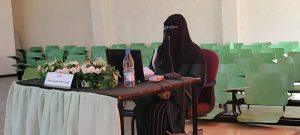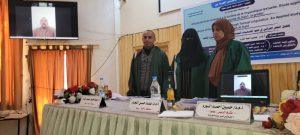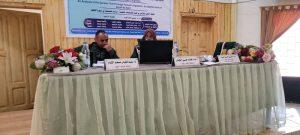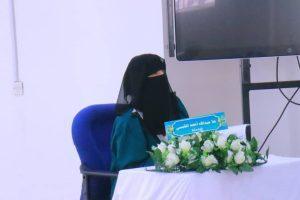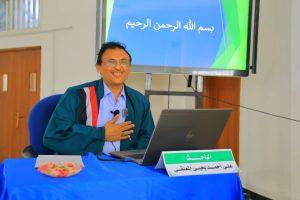Public MA Viva-Voce Examination of Ms. Iman Mohammad Hussein Saboula, from the Department of French Language and Literature, Faculty of Arts & Humanities – Sana’a University

Public MA Viva-Voce Examination of Ms. Iman Mohammad Hussein Saboula, from the Department of French Language and Literature, Faculty of Arts & Humanities – Sana’a University
Ms. Iman Mohammad Hussein Saboula, a student at the Faculty of Arts and Humanities, successfully awarded her MA degree with a commendable grade of 95 in the Department of French Language and Literature, majoring in Linguistics, at Sana’a University. Her thesis, titled “An Analysis of the Quranic Text Through Textual Linguistics: An Applied Study of Surah Al-Kahf,” was defended on Sunday, 21 Jumada II 1446 Hijri, corresponding to December 22, 2024.
The Viva-Voce Committee, which was formed based on a resolution issued by the Post-Graduate Studies and Scientific Research Council, consisted of the following:
1. Prof. Hana Hussein Al-Najjar, Internal Examiner, Sana’a University, Chair.
2. Hussein Ahmed Al-Ward Main Supervisor, Sana’a University, Member.
3. Dr. Abduljabbar Masoud Al-Tam, External Examiner, Dhamar University, Member.
The primary objective of the thesis was to demonstrate the superiority of the stylistic features of the Holy Qur’an in comparison to other linguistic forms, particularly in terms of eloquence and artistic composition. The research was conducted through an analytical and descriptive lens.
The findings of the thesis revealed that the eloquence of the Holy Qur’an provides a rich and inspiring linguistic resource for writers seeking to enhance their literary creations. Additionally, the study established that textual linguistics possesses the capability to elucidate the structural engineering of sentences within the Qur’anic text by employing criteria of coherence and cohesion along with their respective strategies.
In her conclusions, the student proposed several recommendations for future research. She urged scholars to explore coherence tools and consistency mechanisms that were not addressed in her study and to apply these frameworks to the Qur’anic text, both in Surat Al-Kahf and in other chapters of the Holy Qur’an. Furthermore, she advised researchers focusing on textual coherence or consistency to engage in extensive reading prior to embarking on their studies to ensure they possess adequate resources and to avoid conflating these two concepts, which is a common oversight among scholars. This distinction is crucial for differentiating between high-quality and low-quality texts.
The Viva-Voce was attended by several academics, researchers, students, and several colleagues and family members of the researcher.
